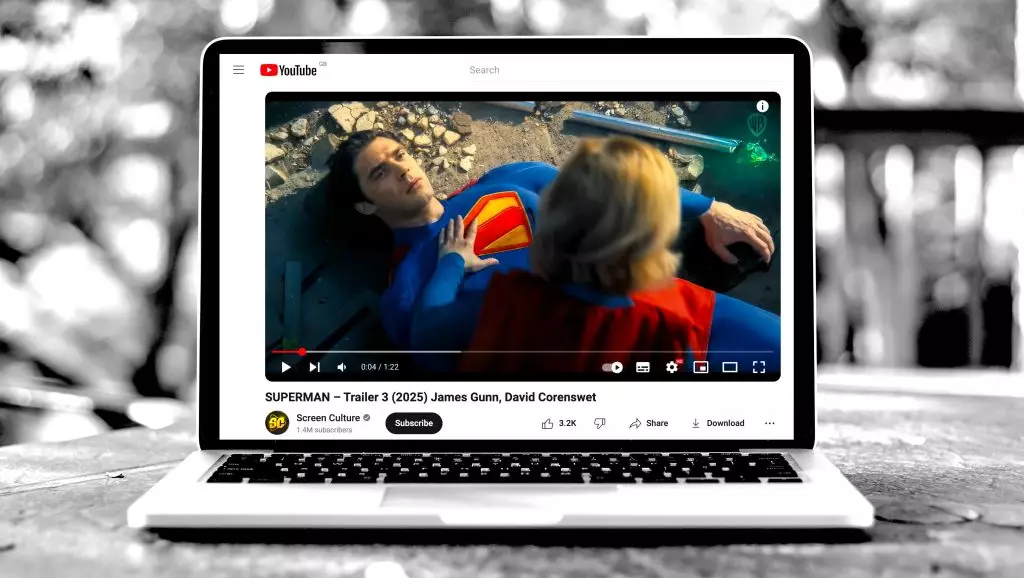In the fast-paced world of digital content, YouTube continues to break new ground with an explosive new trend: AI-generated movie trailers. Channels like Screen Culture and KH Studio have surged to popularity, creating tantalizing teasers that play off the existing intellectual property of popular franchises. But the question remains: how far can creativity go before it infringes on originality? This dilemma has recently spurred YouTube to take action against these channels, unearthing an intense debate about creativity, copyright, and monetization.
Both channels have relied heavily on AI technology to produce their works, crafting seemingly authentic trailers for movies that never existed or will never come to fruition. For instance, who wouldn’t be intrigued by a James Bond film starring Hollywood hearts like Henry Cavill and Margot Robbie, or a bizarre season of “Squid Game” featuring Leonardo DiCaprio? By leveraging AI imagery to enrich narrative possibilities, these creators have attracted a massive following, tapping into the fan culture of beloved cinematic universes.
YouTube’s Crackdown on Monetization
Despite their viral success, YouTube decided to suspend the monetization capabilities of both channels after a Deadline investigation exposed the intricacies of their content creation. According to reports, this action is part of broader attempts by the platform to enforce its monetization policies, which require that creators significantly transform borrowed material. It raises questions concerning fairness in creative expression while also highlighting the thorns of a platform that has often been accused of prioritizing ad revenue over originality.
What’s particularly troubling about the situation is the alleged collaboration between certain Hollywood studios and YouTube. It appears that instead of standing against copyright infringement, some studios are quietly nudging YouTube to redirect ad revenue from these channels back to them. This ignites fierce debates on the ethical implications of leveraging internet fame, especially coming from entities that should protect the very creativity they exploit.
The Creative Dilemma
The stance of KH Studio’s founder sheds light on a creative conflict that many content creators may face. While he expresses that his motive is pure entertainment—creating “what if” scenarios—a thin line exists between playful speculation and misleading representation. With the ever-blurring boundaries of reality in the age of AI advancements, how can fans distinguish fun from financial exploitation? This question is pivotally important not just for creators but also for their audiences.
Screen Culture’s growth has been staggering; founder Nikhil P. Chaudhari supervises a team dedicated to producing up to 12 videos a week. This meteoric rise to 1.4 billion views and 1.4 million subscribers speaks volumes about the appetite for this innovative yet controversial content. The algorithm appears to favor such videos, allowing them to outrank official trailers in search results. This situation inevitably invites scrutiny not just about copyright but about the responsibility of YouTube’s platform when it comes to its content recommendations.
Implications for the Future of Digital Content
As YouTube navigates this intricate web of creativity, copyright, and consumer desire, the implications for digital content creators extend far beyond just monetary gain. The platform’s decision to demote channels like Screen Culture and KH Studio illustrates a potent truth: the rules governing digital marketplaces are continually evolving, and creators must adapt quickly or face potential backlash. If these channels reconstitute their strategies to comply with YouTube’s strict guidelines, they could very well find a way back into the monetization fold.
The complexities of AI in creative endeavors signal a broader trend in the digital landscape. How do we celebrate innovation while also safeguarding the foundations of originality? There is a compelling case to be made for encouraging imaginative expression, but it cannot come at the expense of clarity. When entertainment becomes indistinguishable from misleading content, we must carefully consider what we prioritize as a society that values both creativity and integrity.
As the discourse on AI-generated content unfolds, both creators and audiences face pivotal challenges, and the industry as a whole may need to think critically about how these new technologies will shape the future of storytelling.

